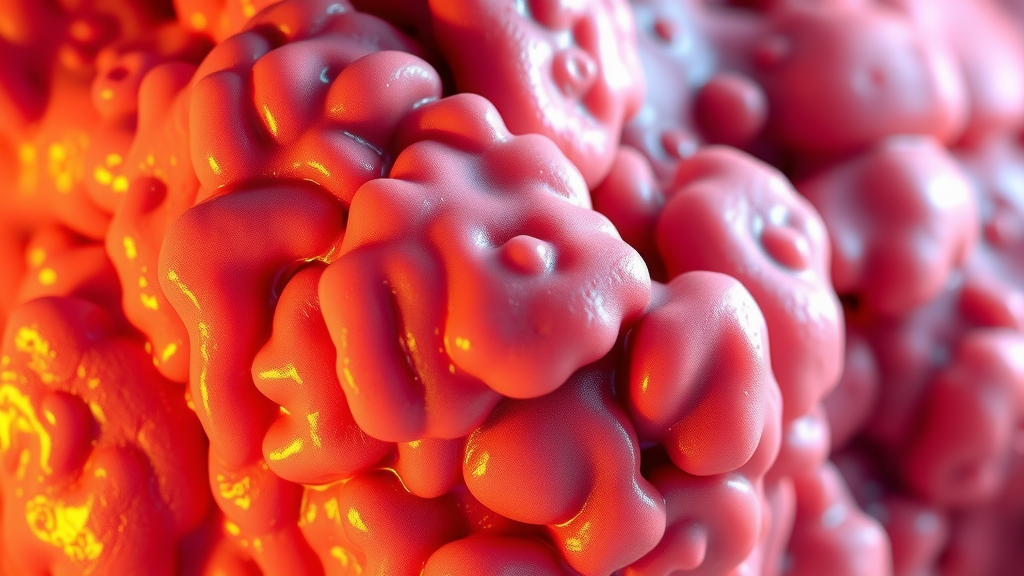
Chronic inflammation poses a significant risk to overall health. Granulomas, which are small clusters of inflammatory cells, often arise as a result of this prolonged inflammatory response.
These lesions can serve as indicators of underlying health issues, making it imperative to explore unique paths to relief.
Chronic inflammation may contribute to various complications, including granuloma formation, highlighting the need for effective relief strategies to manage this persistent condition.
‘Click here to learn more about:’ the ultimate anti inflammatory guide
Unique Approaches to Managing Chronic Inflammation
Implementing several lifestyle changes can significantly aid in managing the symptoms associated with chronic inflammation.
A focus on an anti-inflammatory diet rich in whole foods, fruits, and vegetables can serve as a strong foundation for reducing inflammation.
Regular physical activity plays a vital role in lowering inflammation levels, assisting in overall health improvement.
Dietary Considerations
Incorporating omega-3 fatty acids and curcumin supplements may further enhance your inflammation management strategy. A personalized elimination diet can help identify food sensitivities that may trigger inflammatory responses.
Adequate hydration and quality sleep are critical components that support overall health and facilitate inflammation reduction.
Stress Management Techniques
Utilizing stress reduction techniques, such as mindfulness or yoga, can effectively lower inflammation levels as well. Regular consultations with healthcare professionals for tailored management strategies can optimize care and allow for adjustments based on individual health needs.
Lifestyle Modifications
Maintaining a healthy weight is essential in combatting inflammation; being overweight can exacerbate inflammatory processes.
Avoiding smoking and limiting alcohol consumption are also important lifestyle changes that support inflammation reduction.

Understanding Chronic Granulomatous Disease
Chronic Granulomatous Disease (CGD) results from specific genetic mutations that significantly impair the immune system’s ability to combat infections.
These genetic mutations primarily disrupt the function of phagocytes, which are essential white blood cells tasked with defending the body against bacterial and fungal infections.
The NADPH oxidase complex, responsible for pathogen destruction, becomes dysfunctional in CGD, resulting in increased vulnerability to infections.
This heightened susceptibility leads to recurrent inflammatory responses, making early diagnosis and effective management essential for reducing complications associated with chronic granulomatous inflammation. Understanding the genetic basis and implications of CGD can provide crucial insights into individual health challenges and pave the way for targeted therapeutic interventions.
The Role Of The Immune System
The immune system serves as the body’s defense against pathogens, and its functionality becomes particularly relevant when examining chronic granulomatous disease (CGD). This genetic disorder significantly impairs the immune system’s ability to eliminate bacteria and fungi.
Key components affected by CGD include neutrophils, which are white blood cells essential for fighting off infections.
These immune cells are compromised in patients with CGD.
Defective Immune Response
Additionally, macrophages struggle to effectively engulf pathogens, resulting in the formation of granulomas.
In CGD, the oxidative burst mechanism that typically aids neutrophils in killing pathogens is defective. This failure leads to prolonged inflammation and increased susceptibility to infections, hindering the immune response necessary for maintaining health and homeostasis.
Implications for Patient Health
As a consequence of these immune system deficits, patients with CGD experience a range of severe infections and complications, necessitating specialized treatment approaches.
Understanding the intricate workings of the immune system clarifies why individuals with CGD are vulnerable.
Common Signs And Symptoms Of Granuloma
Awareness of less common symptoms can assist in understanding the complexities of granulomas. Joint pain may frequently go unnoticed as it is often attributed to other conditions.
Unexplained weight loss or malaise can signify underlying complications related to chronic inflammation.
Organ-Specific Symptoms
Granulomas can lead to various organ-specific symptoms:
- Respiratory difficulties: These arise from granulomas in the lungs.
- Gastrointestinal issues: Symptoms may manifest from granulomas in the intestines.
Skin Manifestations
Notably, the presence of skin manifestations can appear as benign bumps or lesions. These are frequently misdiagnosed, highlighting the importance of thorough medical evaluation to catch these elusive signs early.
Managing Chronic Inflammation Related Symptoms
Chronic inflammation poses a variety of health challenges, including autoimmune disorders and skin conditions. Addressing these symptoms often requires a multifaceted approach focused on lifestyle modifications and dietary changes.
Anti-Inflammatory Strategies
Implementing the following strategies can help manage chronic inflammation:.
- Anti-inflammatory diet: Emphasize whole foods, fruits, and vegetables.
- Regular physical activity: Engage in exercises that can help reduce inflammation levels.
- Stress management: Incorporate techniques such as mindfulness or yoga.
- Supplements: Explore omega-3 fatty acids and curcumin to manage symptoms.
- Personalized elimination diets: Identify food sensitivities that may trigger inflammation.
Additional Recommendations
Further recommendations to combat chronic inflammation include:.
- Ensuring adequate hydration and sleep.
- Maintaining a healthy weight to decrease inflammation.
- Avoiding smoking and limiting alcohol consumption.
- Regular consultations with healthcare professionals for tailored strategies.
Implementing these lifestyle changes consistently can lead to long-term benefits, supporting overall health and wellness.
| Immune System Component | Impact of CGD |
|---|---|
| Neutrophils | Compromised ability to fight infections |
| Macrophages | Difficulty engulfing pathogens, leading to granuloma formation |
| Oxidative Burst Mechanism | Defective, resulting in prolonged inflammation |
| Common Symptoms | Joint pain, unexplained weight loss, respiratory and gastrointestinal issues |
Inflammation And Its Effects On Health
Chronic inflammation emerges as a substantial health concern that stretches beyond mere immediate symptoms. Persistent inflammation can lead to serious health complications, including permanent tissue damage and organ dysfunction.
Studies indicate that chronic inflammation correlates with various diseases, such as arthritis, diabetes, and cardiovascular diseases.
Psychological consequences may also surface, with anxiety and depression frequently linked to ongoing pain and discomfort.
Monitoring inflammation markers regularly and understanding their health implications can facilitate timely intervention and maintain overall wellness.
Health Complications Linked to Chronic Inflammation
- Autoimmune disorders: Conditions where the immune system mistakenly attacks the body’s tissues.
- Heart disease: Chronic inflammation can contribute to the development of heart-related issues.
- Diabetes: Inflammation plays a role in insulin resistance and metabolic syndrome.
- Psychological effects: Long-term inflammation is associated with increased rates of mental health disorders.
Addressing inflammation holistically is essential for improving long-term health outcomes. Implementing lifestyle changes and maintaining an anti-inflammatory diet rich in whole foods, fruits, and vegetables can significantly minimize inflammation levels.
Exploring Genetic Factors In Disease
Investigating gene-environment interactions illuminates factors contributing to the susceptibility of chronic diseases. Specific genes influence an individual’s propensity for conditions like chronic granulomatous disease and other inflammatory disorders. Identifiable genes associated with various health issues have prompted advances in genetic testing, providing insights into personal risk factors. Environmental factors, including diet and physical activity, interact with genetics, potentially modulating disease outcomes.
Gene-Environment Interactions
- Diet: Certain foods may exacerbate or alleviate inflammation based on genetic predispositions.
- Physical Activity: Regular exercise can influence inflammation levels and overall health.
- Stress: Managing stress is essential as it can impact genetic expression related to inflammation.
Recognizing these interactions can pave the way for personalized treatment plans, helping mitigate genetic risks and promoting better health management strategies.
Inflammation and Genetic Factors in Disease
- Chronic inflammation is linked to a 50% increased risk of developing heart disease.
- Research shows that 60% of individuals with autoimmune disorders have a genetic predisposition.
- Dietary choices can influence inflammation levels by up to 30%, depending on genetic factors.
- Regular physical activity can reduce inflammation markers by 20% in genetically predisposed individuals.
Diagnostic Approaches For Chronic Conditions
Advancements in diagnostic techniques are transforming the detection of chronic granulomatous disease. Emerging technologies such as next-generation sequencing (NGS) enhance the identification of genetic mutations associated with various granulomatous diseases.
Advanced imaging modalities like PET scans and MRI significantly improve the visualization of granuloma formations, thereby enhancing diagnostic accuracy.
Biomarkers are also evolving, offering insights that refine diagnostic accuracy by indicating specific inflammatory responses.
Integrating traditional methods with modern technologies ensures a comprehensive understanding of granulomatous conditions, paving the way for timely interventions and improved patient outcomes.
Treatment Options For Granulomatous Lesions
Effective management of granulomatous lesions requires innovative therapies. Corticosteroids serve as a cornerstone in reducing inflammation and alleviating symptoms associated with chronic granulomatous disease.
Immunosuppressive agents are also utilized to control excessive immune responses that exacerbate granuloma formation. Recent advancements feature biological agents and targeted therapies that demonstrate significant promise in reshaping treatment paradigms.
Understanding the mechanisms of these novel therapies highlights their potential to enhance treatment efficacy.
Integrating Lifestyle Modifications
Adopting lifestyle modifications plays an important role in managing chronic inflammation.
An anti-inflammatory diet rich in whole foods, fruits, and vegetables is essential.
Incorporating regular physical activity can also help reduce inflammation levels. Stress management techniques, such as mindfulness or yoga, are beneficial in lowering inflammation.
Supplement Options
Utilizing supplements like omega-3 fatty acids and curcumin may assist in managing symptoms.
Developing a personalized elimination diet could help identify food sensitivities that trigger inflammation. Staying adequately hydrated and ensuring sufficient sleep supports overall health and reduces inflammation.
Collaborative Healthcare Approaches
Regular consultations with healthcare professionals are vital for comprehensive care.
Maintaining a healthy weight can decrease inflammation levels in the body.
Avoiding smoking and limiting alcohol consumption are essential lifestyle changes that contribute positively to inflammation management.
Ultimately, a balanced approach that combines diet, exercise, and mental health strategies is crucial in combating chronic inflammation.
Consistency in implementing lifestyle changes can lead to long-term benefits and overall wellness.
Chronic Conditions and Their Management
- Next-generation sequencing (NGS) has revolutionized the identification of genetic mutations in chronic granulomatous disease.
- Corticosteroids are widely recognized for their effectiveness in reducing inflammation associated with granulomatous lesions.
- Regular physical activity is proven to lower inflammation levels and improve overall health.
- Implementing stress management techniques can significantly contribute to reducing chronic inflammation.
The Connection Between Infections And Granuloma
Granulomas serve as a distinct response by the immune system, often initiated by persistent infections. Numerous case studies have established a significant association between specific infections, such as Mycobacterium tuberculosis, and granulomatous formations.
Chronic granulomatous disease illustrates how the immune system may fail to eliminate certain pathogens, leading to granuloma development.
Furthermore, infection with fungi, including Histoplasma, can induce similar chronic inflammatory responses.
Eliminating these infections becomes critical in conditions where granulomas complicate medical diagnosis and treatment, particularly in patients with underlying immune system issues.
Managing Autoimmune Disease Symptoms
Effective management strategies for autoimmune disease symptoms can significantly enhance quality of life. Notably, adopting an anti-inflammatory diet rich in whole foods, fruits, and vegetables is fundamental to reducing inflammation.
Regular physical activity also plays a key role in lowering inflammation levels and improving overall health outcomes. Incorporating stress management techniques, such as mindfulness and yoga practices, can further assist in controlling inflammatory responses.
Additional strategies include:
- Utilizing omega-3 fatty acids and curcumin as effective supplements for inflammation management.
- Establishing a personalized elimination diet to identify food sensitivities that may exacerbate symptoms.
- Ensuring adequate hydration and sleep to bolster overall health and inflammation reduction.
- Maintaining a healthy weight to decrease inflammation levels throughout the body.
- Consulting with healthcare professionals for tailored management strategies.
- Avoiding smoking and limiting alcohol consumption as beneficial lifestyle adjustments.
Identifying triggers is essential for effectively managing chronic inflammation. Regular consultations with healthcare providers can aid in developing a comprehensive care plan. A balanced approach integrating diet, exercise, and mental health will yield the best outcomes. Consistency in implementing these lifestyle changes can lead to lasting benefits and improved wellness.
Infections and Granulomas
- Granulomas are often formed as a result of the immune system’s response to persistent infections, particularly from pathogens like Mycobacterium tuberculosis.
- Chronic granulomatous disease exemplifies how the immune system may be unable to effectively eliminate certain pathogens, resulting in granuloma formation.
- Fungal infections, such as those caused by Histoplasma, can also trigger chronic inflammatory responses similar to those seen with bacterial infections.
- Addressing underlying infections is crucial for patients with granulomas, especially those with compromised immune systems, to improve diagnosis and treatment outcomes.
Fungal Infections And Inflammatory Responses
Fungal pathogens play a significant role in modulating the human immune system, frequently exacerbating inflammatory responses. Aspergillus, for instance, has the capability to invade lung tissues, thereby triggering a robust immune reaction characterized by inflammation.
Candida species possess mechanisms to elude immune detection, leading to elevated cytokine levels that exacerbate inflammatory conditions.
Cryptococcus can provoke a chronic inflammatory state, culminating in granuloma formation within tissues.
Such heightened inflammatory responses can compromise the immune system further, rendering patients more susceptible to bacterial and other infectious diseases. Recognizing these mechanisms aids in developing effective treatment strategies and enhancing patient outcomes in chronic granulomatous disease and other related conditions.
Key Fungal Pathogens
- Aspergillus: Often associated with respiratory issues, it can cause allergic and invasive diseases.
- Candida: Known for causing opportunistic infections in immunocompromised individuals.
- Cryptococcus: Primarily affects the lungs and can lead to severe neurological complications.
The interaction between fungal infections and inflammatory responses is complex, impacting overall health significantly.
Importance Of Early Medical Intervention
Effective management of chronic granulomatous disease relies heavily on timely medical intervention. Early diagnosis enables healthcare providers to initiate targeted treatment strategies that can prevent severe complications related to prolonged inflammation. A proactive approach can greatly enhance treatment outcomes and diminish the risk of organ dysfunction arising from uncontrolled inflammatory responses.
Long-Term Benefits of Early Diagnosis and Treatment
- Reduces the likelihood of chronic infections.
- Helps maintain optimal organ function.
- Improves quality of life for patients through symptom management.
Implementing individualized care plans increases the chance of successful symptom management. Regular follow-ups establish necessary adjustments in treatment based on disease progression, thereby aiding in sustaining overall health. Recognizing early signs and symptoms significantly improves long-term health and mitigates the impact of fungal infections.
Chronic Inflammation Solutions
Chronic inflammation is a prolonged response that can lead to various health challenges, including autoimmune disorders and skin conditions. To manage symptoms effectively, consider the following approaches:
- Adopt an anti-inflammatory diet: Focus on whole foods, fruits, and vegetables to support overall health.
- Engage in regular physical activity: This practice helps lower inflammation levels.
- Explore stress management techniques: Methods such as mindfulness or yoga can significantly reduce inflammation.
- Consider supplements: Omega-3 fatty acids and curcumin are beneficial in managing symptoms.
- Personalized elimination diet: Identify and remove food sensitivities that may trigger inflammation.
- Maintain proper hydration and sleep: These elements are crucial for overall health and inflammation reduction.
- Consult healthcare professionals: Regular check-ins ensure comprehensive care tailored to individual needs.
- Avoid smoking and limit alcohol: Implementing these lifestyle changes can aid in overall health improvement.
Managing chronic inflammation through lifestyle modifications can lead to lasting health improvements.
Fungal Infections and Inflammatory Responses
- Fungal infections can lead to a compromised immune system, increasing susceptibility to other infectious diseases.
- Chronic inflammation is linked to various health challenges, including autoimmune disorders and chronic granulomatous disease.
- Early diagnosis and intervention can significantly improve treatment outcomes and reduce the risk of organ dysfunction.
- Adopting an anti-inflammatory lifestyle can effectively manage symptoms and promote overall health.
Common Chronic Inflammation Foods | Uncommon Triggers To Avoid
Chronic Inflammation Cause| Tame Inflammation With Food



